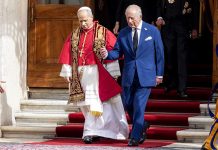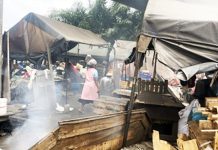However imperfect, Nigeria’s democratic, peaceful election was a breath of fresh air in a region crippled by coups and persistent democratic backsliding.
On March 1, Nigeria’s Independent National Electoral Commission (INEC) declared Bola Tinubu of the governing All Progressives Congress (APC) the winner of the 2023 presidential election.
It said the 70-year-old former Lagos governor won the race with 37 percent of the vote, while his main rival, People’s Democratic Party (PDP) candidate Atiku Abubakar, came second with 29 percent. The Labour Party’s Peter Obi, who had become a surprise favourite in the run-up to the election, came third with 25 percent.
Soon after the results were announced, congratulatory messages started to pour in from across Africa and the world. The chairperson of the African Union Commission, Moussa Faki Mahamat, and the chairman of the Economic Community of West African States (ECOWAS), Guinea-Bissau President Umaro Sissoco Embalo, congratulated President-elect Tinubu on his win. So did the leaders of Ghana, Sierra Leone, Liberia and the Gambia.
The US Department of State, meanwhile, congratulated not only Tinubu but all Nigerians for what it viewed as a “competitive election” that “represents a new period for Nigerian politics and democracy”. UK Foreign Secretary James Cleverly also issued a statement, commending Nigerian voters “for their participation in the Presidential and National Assembly elections and for their patience and resilience in exercising their democratic rights”.
Despite these waves of praise and celebration, however, the election was hardly without problems.
It recorded the lowest turnout since Nigeria’s return to democracy in 1999, with only 27 percent of eligible voters casting ballots. There were widespread allegations of voter suppression and vote buying as well as a few isolated incidents of violence. Most crucially, both Abubakar and Obi disputed the outcome and vowed to challenge it in Nigeria’s highest appeals court.
Nevertheless, despite being far from perfect, Nigeria’s largely peaceful and somewhat efficiently conducted election – which received a stamp of approval from the African Union Election Observation Mission – was a much-welcomed sight in a region long suffering from military coups and strongmen clinging to power.
The head of the ECOWAS Observer Mission to Nigeria, former Sierra Leone President Ernest Koroma, had acknowledged the regional importance of this election days before the polls opened. “Nigeria’s election remains a guide to West Africa,” Koroma said on February 23. “Its failure would spell doom for the sub-region”.
Koromo felt the need to underline the importance of this election because in the days leading up to it, there were growing concerns about the possibility of electoral violence and other likely obstacles to a peaceful transfer of power – and for good reason.
In the last few years, Nigeria has been grappling with severe socio-political and economic challenges, including underfunded public services, police brutality, a stagnant economy, and countrywide insecurity caused by Boko Haram, armed bandits and separatists. Coupled with a long history of military rule, all this raised fears that Nigeria may experience some democratic backsliding in this election cycle.
But despite growing tensions, Nigeria successfully conducted its election and determined its next president without much disturbance. The military stepped in to ensure the security of the polls, but made no move to intervene in the democratic process. Sure, Obi and Abubakar dispute the result, but they appear determined to do so not through violence and populist provocation, but by legal means.
All this stands in striking contrast to the rest of Nigeria’s immediate neighbourhood, where many countries are suffering under military juntas or struggling to hold free and fair elections.
By Tafi Mhaka
Source: aljazeera.com
The views expressed in this article are the author’s own and do not necessarily reflect The Chronicle’s stance.









